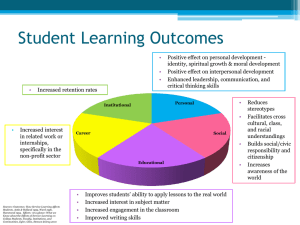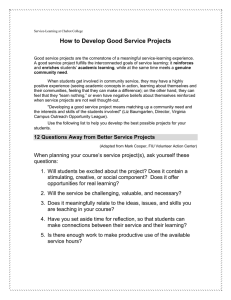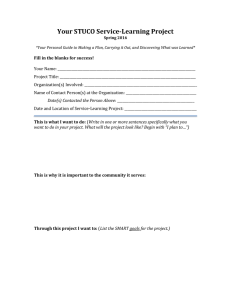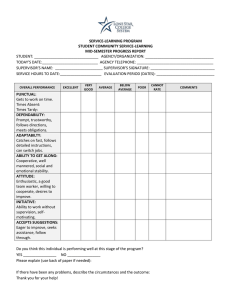A Model of Community Engagement and Service -learning
advertisement
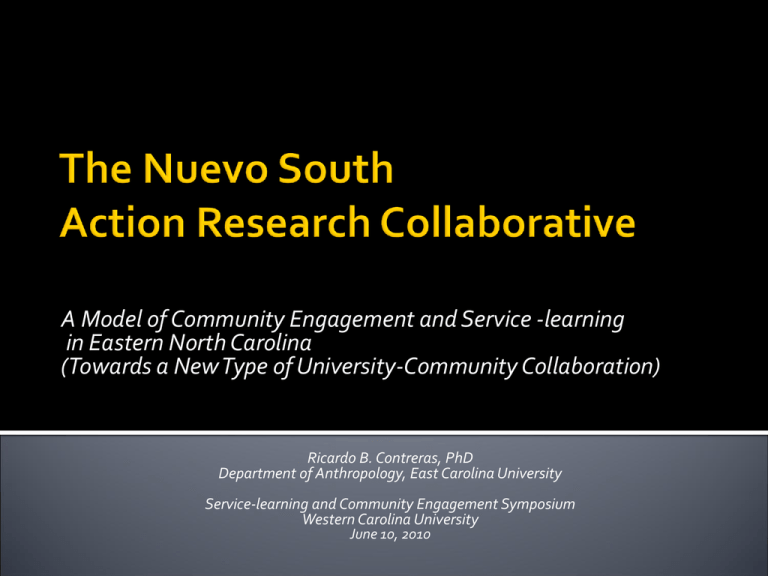
A Model of Community Engagement and Service -learning in Eastern North Carolina (Towards a New Type of University-Community Collaboration) Ricardo B. Contreras, PhD Department of Anthropology, East Carolina University Service-learning and Community Engagement Symposium Western Carolina University June 10, 2010 1. 2. 3. 4. 5. 6. 7. Introduction The program Historical background Phase I: Restricted partnership Phase II: Open coalition Challenges Conclusions To present an evolving program of universitycommunity engagement on Latino issues. To identify some of the challenges of the program. To apply some of the lessons learned in the implementation of this program, to a general model of university-community engagement. The Nuevo South Action Research Collaborative (NSARC), formerly Nuevo South Community Research Initiative (NSCRI). Effort to engage the university faculty, staff, and students with the Latino community of eastern North Carolina (ENC) through applied research and action. Phase I. Restricted partnership. Fall 2008Early 2010 Phase II. Open coalition. April 2010-Present Informal partnership between faculty from the ECU Department of Anthropology and a single grassroots community organization. Synergy: Leader of community organization was looking for a new way of partnering with the university Anthropology faculty wanted to develop sustainable partnerships with community organizations. Two main motivations: ▪ Applied and action research ▪ Community connections for migration research Intense rapport building process Faculty and organization leader jointly identified community needs (no formal needs assessment study) Faculty wrote proposals for the organization Faculty assisted in program implementation The community organization was the fiscal agent Emphasis on community research, hence the name “Nuevo South Community Research Initiative” No formal binding agreement Some volunteering and service-learning activities associated with projects Diabetes awareness workshops Promoting healthy lifestyles through community health advisors Involvement of faculty from different academic units Volunteering and service-learning (Applied Anthropology and Social Work Practicum) Enhancing Latino youth civic engagement Working relations were developed with faculty from different academic units School of Social Work College of Nursing Department of Health Education and Promotion Relationships were established with members of the Latino community (beyond the partner organization) and service providers Students became involved in projects through volunteer and service-learning activities Website was created (www.ecu.edu/anth/nuevosouth) Re-launch the collaborative as a more inclusive coalition based on the realization that the restricted partnership model was not sustainable. New collaborative has to: Be as inclusive as possible at the university and community level Represent the social and cultural diversity of the Latino community Involve community organizations, service providers, and nonorganized residents Meeting was called: 50 attendees Grassroots community organizations, community residents, providers, faculty from different academic units, students and staff Goal: think on how to collaborate to improve the quality of life of the Latino community of ENC Core activities (multi-emphasis): Program implementation or solutions Research Volunteer and service-learning Advocacy Guiding principles Accountability Participation Knowledge equivalence Reciprocity Focus Areas (Holistic): Community and capacity building Culture Education Health and human services Migration and settlement Governance and Leadership (Participatory): Director Advisory board Co-c00rdinators for each focus area Volunteer and service-learning (no funding required) Computer literacy with community organizations English as a second language Mentoring program for incoming Latino students (faculty and student volunteers) Requires funding Lay health advisors program Strengthening the network of Latino community organizations (some activities require funding and some do not) Transnational family and community support program Cultural competency training for service providers The restricted partnership model is fragile: Susceptible to fluctuations in the local political climate Susceptible to personal misunderstandings and conflicts In general, there is a potential cultural disconnection between university and community organizations: University: culture of grants, projects, and accountability Community organizations: culture of voluntarism and processes (vs. projects) Wrong assumption: community organizations share the institutional culture of grants and projects It is necessary to determine whether this disconnection exists, and if it does, it needs to be made explicit. Strategies need to be developed to overcome it. A sustainable partnership needs to rest on transparent and open communication among members. Problems need to be discussed openly and immediately. Include in the collaborative not only leaders of community organizations, but also residents who do not play leadership roles in organizations. Volunteering and service-learning activities can play a key role in a university-community collaborative Satisfy community needs with little or no monetary investment University students can become role models to community youth Educating a new generation of communityconscious professionals Bridging the cultural divide between the university and the community Changing the accepted practices within each of these two players (necessary in order to bridge the divide) Make university researchers and organizations accountable to the people with whom they work in the community Develop a transparent system of communication among participants
